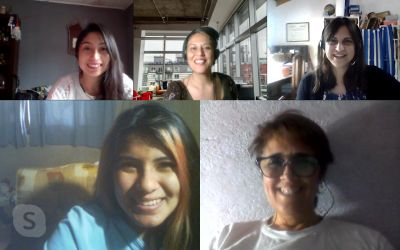Why is this project important for the community?
English teaching projects are very important for the community. Both projects work primarily with working-class families and learning English opens up new opportunities for growth. In addition, for the students, they function as places of containment and accompaniment where they interact with other children, teachers, and international volunteers. These projects not only teach English but also help students develop new skills and provide them with new tools.
Volunteer's Role
Your role in the school will be proportionate to your level of Spanish and the amount of time you can volunteer for. Consequently, this program is ideal for undergraduate students of modern languages, particularly those interested in teaching. If your Spanish and/or time is limited, you will be able to assist in classes.
The online project will be sustained even with the presence of the students in the classrooms. Volunteers will be able to appear virtually and contribute to conversation workshops and other specific tasks in the classes. These activities will depend on the needs of the institutes and the interests and knowledge of the volunteers.
How does your work impact the community?
Not only does this school offer the families a chance to further their education, but it also provides a center for the community. It is a place of exchange and hope, based on the idea that the children can study and have a good future because their parents were not awarded with the same opportunities even if the schools and the best universities are free. Students can connect more intimately with the volunteers and share their cultural differences, their accents, theirs travels, and more. The volunteers also symbolize hope for the students that admire them because they are role models. They make the students believe in a brighter future and instill in them the motivation and aspiration to achieve their goals, no matter how big and regardless of their current socioeconomic status.
The volunteer teachers provide a rich and cultured education to the students. Through volunteers, the students have noticed how much they have achieved and how they can use English as a communication tool to be able to exchange their culture and traditions. The volunteers use their knowledge of English to help the students in group classes. The presence of native speakers evidently is very helpful to the children's learning of the language and also for the younger teachers.
What can you learn as a volunteer?
Learning is a two-way street because the volunteer also learns through this experience. Their official duties are to assist the teenaged teachers, help them with pronunciation or grammatical rules, correct homework, read and explain to the children the basic elements of the language. Moreover, they can also help the oldest students get ready for international exams. This work allows the volunteer to exchange with people from different cultures, mainly thanks to the mix between communities from various countries of Latin America. Furthermore, teaching is the perfect exercise to learn how to speak to an audience and to get its attention. The volunteer learns to communicate with the youngest children who don't speak English correctly and can learn how to adapt quickly and use other means of communication. Above all, the volunteer can create relationships with their students that will go beyond the classroom.
Soft Skills that teaching English volunteers are most likely to develop
Long term volunteers (3 months +) can get an International Volunteer Certificate from GLORE Certification, a Project co-funded by the Erasmus+ Programme of the European Union. You can choose up to 5 skills to certify.
- Organization and Time Management
- Autonomy
- Confidence
- Creativity & Innovation
- Comm and Active Listening
- Critical Thinking
- Decision Making
- Ethics and Work Commitment
- Empathy
- Flexibility
- Initiative
- Multicultural Awareness
- Open-mindedness
- Public Speaking
- Responsibility
- Self Awareness
- Team Work
- Learning to learn
- Digital Communication
Availability
The project is available mainly between March and December (check for possible summer courses in January and February).
It welcomes students of all levels and ages, for two-hour lessons. They also teach on Saturday morning, but the volunteer will be able to choose if to attend on the weekends or not.
Most of the classes take place during the afternoon (BA TIMEZONE). There are some classes during the morning with adults, and on Saturday mornings with advanced levels. If your timezone does not allow you to be present at the classes, we can arrange some tasks to provide materials that can be used in the classes such as videos or activities.
First day at work
You will have an introductory talk with the VG staff before starting the Project. Afterward, we’ll arrange a meeting with the directors of the projects to talk about your specific tasks and Schedule.
You will always count on the support of the volunteer’s tutor and the local coordinators, especially at the beginning.
Requirements
-
Spanish Level Required: Not required
-
Minimum Stay: One month

